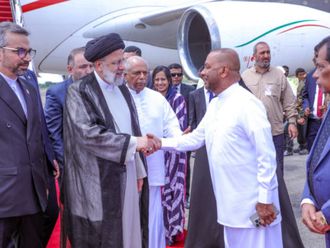Tehran: Iran’s supreme leader on Friday called Israel a “cancerous tumour” that “will undoubtedly be uprooted and destroyed” in an annual speech in support of the Palestinians, renewing threats against Iran’s Mideast enemy.
Supreme Leader Ayatollah Ali Khamenei’s speech marked a subdued Quds Day for Iran, which typically sees government-encouraged mass demonstrations in Tehran and elsewhere in the Islamic Republic, as well as Iranian-allied nations.
Due to the pandemic, Iran largely asked demonstrators to stay home.
Khamenei spoke to the nation in a 30-minute speech aired on state television, a rare address by the supreme leader as other officials in the past gave the keynote speech. He repeatedly referred to Israel as a “cancer” or “tumour”, criticising the US and the West for equipping it with “various kinds of military and non-military tools of power, even with atomic weapons”.
“The Zionist regime is a deadly, cancerous growth and a detriment to this region,” Khamenei said. “It will undoubtedly be uprooted and destroyed.”
Khamenei also compared Israel to the coronavirus during the speech, while saying his anti-Israeli views were not anti-Semitic.
The US and European Union rejected the comments.
US Secretary of State Mike Pompeo on Twitter dismissed them as “disgusting and hateful anti-Semitic remarks” that did not represent the tradition of tolerance of ordinary Iranians.
EU foreign policy chief Josep Borrell said they were “totally unacceptable and represent a deep source of concern”.
2,311 new cases take total to 131,652
Iran yesterday reported another 51 Covid-19 deaths, taking overall fatalities to 7,300.
Health ministry spokesman Kianoush Jahanpour said total infections reached 131,652 after 2,311 new cases.
Fourteen provinces reported no deaths in the past 24-hour period, while six reported just one fatality.
Iraj Harirchi, deputy minister of health, renewed an appeal for Iranians to avoid unnecessary travel during Eid.
“Moving in the red zones puts us in danger and moving in the white zones puts the inhabitants of these zones in danger,” Harirchi said.












